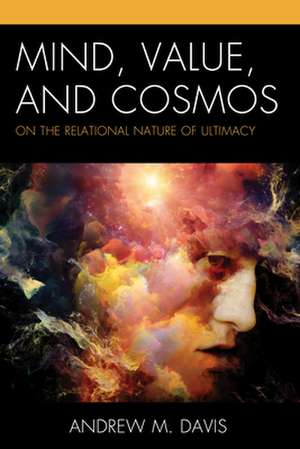Mind, Value, and the Cosmos: Contemporary Whitehead Studies
Autor Andrew M. Davisen Limba Engleză Hardback – 13 oct 2020
Din seria Contemporary Whitehead Studies
- 23%
 Preț: 753.89 lei
Preț: 753.89 lei - 27%
 Preț: 798.96 lei
Preț: 798.96 lei - 27%
 Preț: 658.84 lei
Preț: 658.84 lei - 23%
 Preț: 436.19 lei
Preț: 436.19 lei - 23%
 Preț: 650.93 lei
Preț: 650.93 lei - 23%
 Preț: 635.67 lei
Preț: 635.67 lei -
 Preț: 466.86 lei
Preț: 466.86 lei - 23%
 Preț: 636.69 lei
Preț: 636.69 lei - 23%
 Preț: 671.98 lei
Preț: 671.98 lei - 23%
 Preț: 673.42 lei
Preț: 673.42 lei -
 Preț: 304.50 lei
Preț: 304.50 lei -
 Preț: 321.04 lei
Preț: 321.04 lei -
 Preț: 325.74 lei
Preț: 325.74 lei - 23%
 Preț: 601.92 lei
Preț: 601.92 lei - 23%
 Preț: 547.17 lei
Preț: 547.17 lei - 27%
 Preț: 1076.88 lei
Preț: 1076.88 lei -
 Preț: 323.40 lei
Preț: 323.40 lei -
 Preț: 359.14 lei
Preț: 359.14 lei
Preț: 672.40 lei
Preț vechi: 873.24 lei
-23% Nou
Puncte Express: 1009
Preț estimativ în valută:
128.68€ • 133.67$ • 106.89£
128.68€ • 133.67$ • 106.89£
Carte tipărită la comandă
Livrare economică 03-17 februarie 25
Preluare comenzi: 021 569.72.76
Specificații
ISBN-13: 9781793636393
ISBN-10: 1793636397
Pagini: 242
Dimensiuni: 152 x 229 x 24 mm
Greutate: 0.54 kg
Editura: Rowman & Littlefield
Seria Contemporary Whitehead Studies
ISBN-10: 1793636397
Pagini: 242
Dimensiuni: 152 x 229 x 24 mm
Greutate: 0.54 kg
Editura: Rowman & Littlefield
Seria Contemporary Whitehead Studies
Notă biografică
Andrew M. Davis is program director for the Center for Process Studies at Claremont School of Theology and author of Mind, Value, and Cosmos: On the Relation al Nature of Ultimacy.
Descriere
A engaging dialogue with the modern "axionoetic" proposals of A.N. Whitehead, Keith Ward, and John Leslie, arguing for the relational nature of ultimacy wherein Mind and Value, Possibility and Actuality, God and the World are affirmed as ultimate only in virtue of their relationality. This relationship Whitehead calls "mutual immanence."
